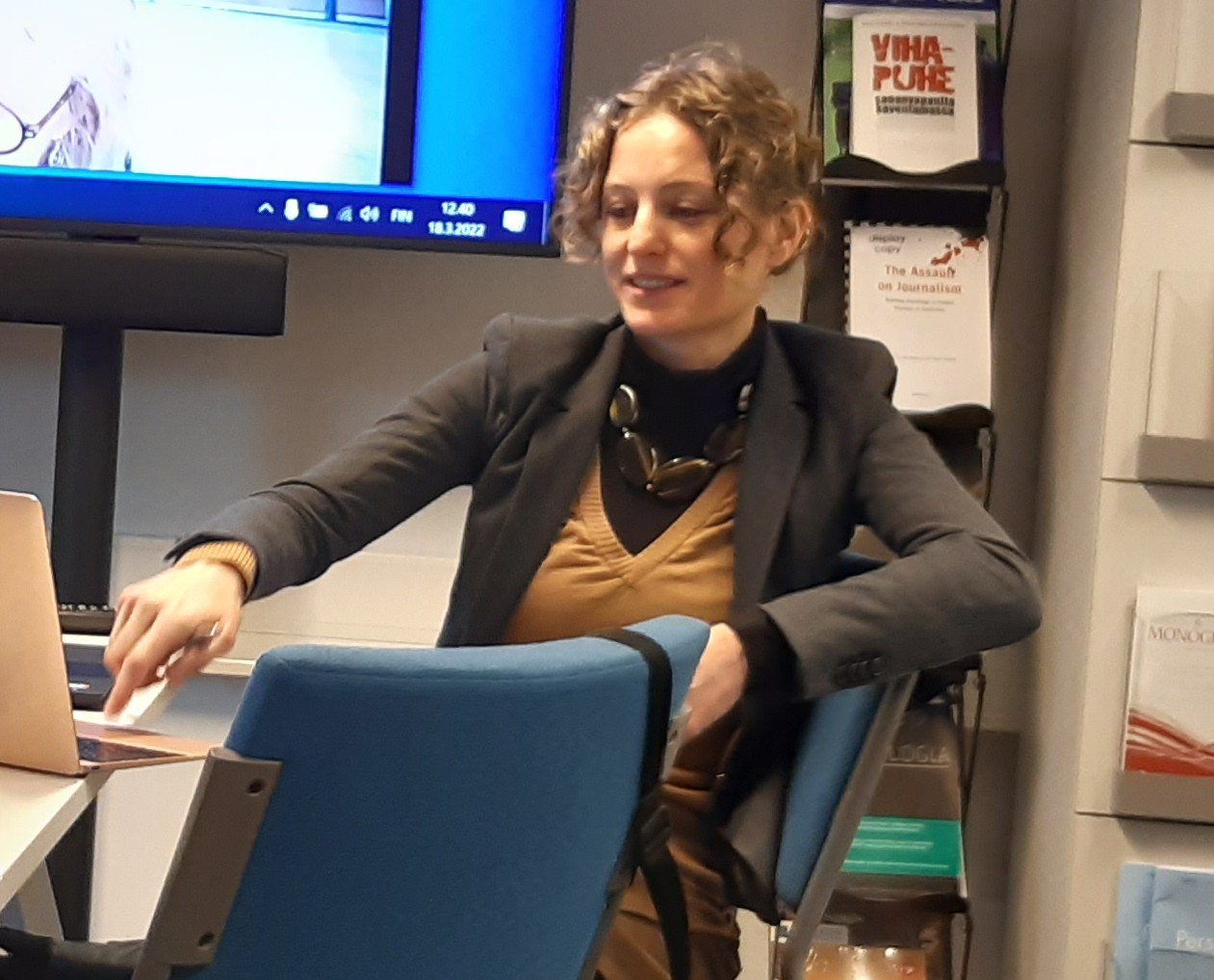On Friday 18 March, TaRC was honoured to receive a guest lecture by the renowned scholar Elisabeth Schimpfössl. She works as a Senior Lecturer (Associate Professor) in Sociology and Policy at Aston University, Birmingham, where she teaches media sociology.
In her talk, she contextualised her argument about how the survival strategies of media managers in Russia have oiled the machinery of 21st-century authoritarianism in the concept of adekvatnost’. Together with her colleague Ilya Yablokov (University of Sheffield), she has elaborated on adekvatnost’ for nearly ten years.
The first encounter happened by pure chance. Both she and Yablokov were working as assistants on the research project Mediating Post-Soviet Difference. When analysing the transcripts of interviews with top journalists Schimpfössl had brought back from a project-related research trip to Moscow, they discovered a phenomenon that has captured them ever since.
Putin had just regained his presidency, which he preceded with yet another major backlash against the free press.
Journalists, meanwhile, were preoccupied with doing the journalism they wanted to do, however, without stepping on important toes. Proficiency in getting the balance right allowed the best of them to realise their projects. They all called this professionalism adekvatnost’ (literal translation: ‘adequacy’).
Adekvatnost’ implies a set of strategies – almost a sixth sense – that helps journalist navigate the newsroom and find a way around the constraining side-effects of censorship and self-censorship.
Adekvatnost’ is essential for efficient news production – what topics to prioritise, how to approach them, what guests to invite and so on. It relieves journalists from constant doubts about whether they are in line with what is expected from them. It also allows them to be creative and innovative. This is key to giving programmes and news the entertaining and engaging elements they require.
The researchers noted that adekvanost’ was very important for media managers as well. They would use it as a criterion in recruiting: those who could do interesting journalism and be creative despite the rules would be hired. Naturally, adekvatnost’ was required more in some areas than others: for instance, cultural journalism was less restricted than political journalism.
Schimpfössl and Yablokov wanted to find out how these strategies played out among those who run major media organisations. Why have some succeeded where others have not?
Producing content that is to the Kremlin’s liking obviously helps, but it is only part of the story. Some Putin worshippers have failed where outspoken regime critics have flourished. It seems that, rather than stubbornly toeing the line, other skills and strategies are required to walk the tightrope – that is, balancing commercial imperatives and Kremlin scrutiny. Here, patronage and alliances with power circles are key.
Interestingly, this ability to “play the game” has similarities to the trend observed in China in the 2000s when many journalists attempted to find greater leeway for societal and investigative reporting, and more commercially oriented forms of journalism, amidst CCP pressures.
As we know, conditions for doing independent journalism in Russia have become notably worse in recent years. Many outlets established earlier have had to move their operations abroad, like Meduza, or shut down.
The war in Ukraine has made matters even worse. There is less room for adekvatnost’ especially following the recent “fake news law” that imposes jail sentences up to 15 years for not toeing the official line in war reporting. Even journalists with connections to Putin might no longer be untouchable.
In this situation, the remaining independent outlets such as the Novaya Gazeta have been put into a difficult position. As Schimpfössl noted, disobeying the law would be risky while playing along could be seen as “oiling of the [state] machinery”.
In these conditions, it was noted that adekvatnost’ has found some form of existence on social media platforms such as Telegram, but future developments remain difficult to predict.
On Tuesday 22 March, Schimpfössl gave a lecture at the University of Helsinki on Russian oligarchs and Western sanctions. The talk was partially based on her award-winning book Rich Russians: From Oligarchs to Bourgeoisie (2018, Oxford University Press).

